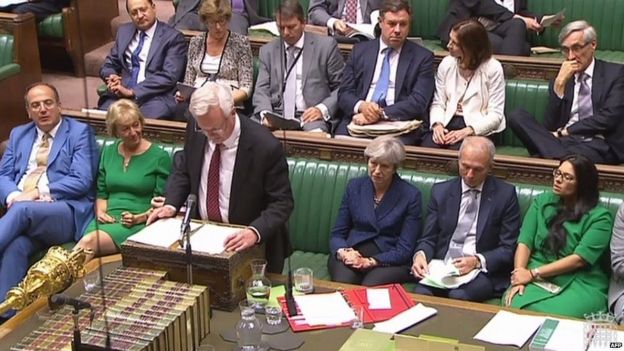The EU is to begin preparing for its post-Brexit trade negotiations with the UK, while refusing to discuss the matter with the British government.
An internal draft document suggests the 27 EU countries should discuss trade among themselves while officials in Brussels prepare the details.
The draft text could yet be revised.
EU Commission chief Jean-Claude Juncker said a lack of compromise over the UK's financial commitments was impeding progress - saying "they have to pay".
Speaking in Luxembourg, Mr Juncker used the analogy of someone covering the bill after ordering 28 beers at a bar to explain the EU's position - and added that the Brexit negotiating process was taking longer than expected.
He also dismissed the wrangling over citizens' rights - another sticking point - as "nonsense", calling on the UK to adopt a "common sense" approach and say "things will stay as they are" after Brexit.
Downing Street said "good progress" was being made in the talks.
- Battles ahead for government's EU legislation
- Deadlock over UK's Brexit bill - Barnier
- Kuenssberg: Brexit talks doomed? Not so fast...
- What would 'no deal' look like?
As the fifth round of talks ended in Brussels on Thursday, the EU's chief negotiator, Michel Barnier, said there was "deadlock" over the UK's Brexit bill.
He said there had not been enough progress to move to the next stage of post-Brexit trade talks - as the UK had hoped - but added that he hoped for "decisive progress" by the time of the December summit of the European Council.
The draft paper submitted to the 27 EU states by European Council president Donald Tusk, suggests free trade talks could open in December - should Prime Minister Theresa May improve her offer on what the UK pays when it leaves.

The government is wading through proposed amendments to the EU Withdrawal Bill
The BBC's Europe correspondent Adam Fleming said the paper contained "something for everyone" - with the reference to trade talks accompanied by a call for the UK to do more to bridge the gap on the key negotiating points.
The document calls for talks - about a transition period and the future relationship - to move to the next phase "as soon as possible".
The draft conclusions - to be put to EU leaders next Friday - also call for more concessions from the UK on its financial obligations and the rights of European nationals who wish to stay after Brexit.
The paper confirms Mr Barnier's assessment, that there has not been "sufficient progress" on three key elements of a withdrawal treaty for leaders to agree to open the trade talks now.
But it says the leaders would welcome developments on these key issues: the rights of three million EU citizens in the UK, protecting peace in Northern Ireland from the effect of a new border and Britain's outstanding "financial obligations".
The council would then pledge to "reassess the state of progress" at their December summit.
Bernd Kolmel, chairman of Germany's Eurosceptic Liberal Conservative Reformers, told BBC Radio 4's Today programme there appeared to have been little progress between the first and fifth round of talks - something he described as a "disaster".
He called on the EU to expand the talks to include its future relationships and trade with the UK.
Anders Vistisen, a Danish Eurosceptic MEP and vice-chair of the EU Parliament's foreign affairs committee, agreed, adding: "The most integral thing is the future relationship. If we are making a bad trade deal for Britain we are also hurting ourselves."
The document states that in order "to be fully ready", EU leaders would ask Mr Barnier and his officials to start preparing now for a transition - albeit without actually starting to talk to the UK about it.
"The European Council invites the Council (Article 50) together with the Union negotiator to start internal preparatory discussions," the draft reads.
A Downing Street spokeswoman would not comment on the draft EU document but said Theresa May "has been clear all along that we need to reach a settlement", adding that UK would honour its financial commitments.
Meanwhile, a crucial plank of the government's Brexit legislation faces a raft of attempted amendments by MPs as ministers seek to steer it through Parliament.
The EU (Withdrawal) Bill will end the supremacy of EU law in the UK and incorporate existing Brussels legislation onto the UK statute book.
Commons Leader Andrea Leadsom said going through the proposed changes was "taking a bit of time" as she confirmed there would be no debate on the bill next week.
No comments:
Post a Comment